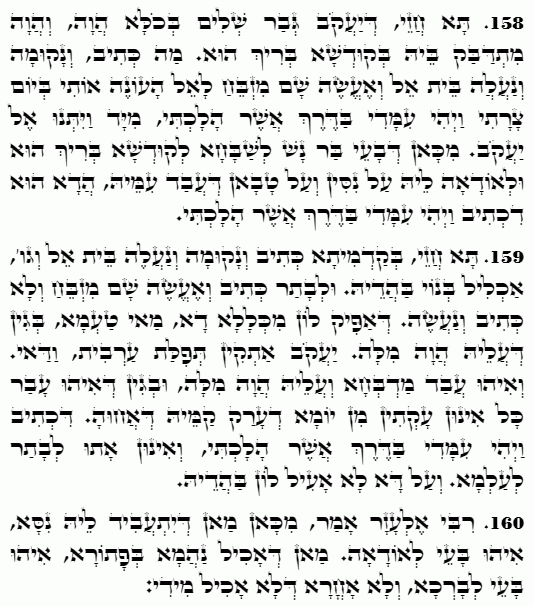Daily Zohar # 4728 – Vayishlach – And I will make there an altar – appreciation
Daily Zohar 4728

Hebrew translation:
159. בֹּא רְאֵה, בַּהַתְחָלָה כָּתוּב וְנָקוּמָה וְנַעֲלֶה בֵּית אֵל וְגוֹ’, הִכְלִיל בָּנָיו עִמּוֹ, וְאַחַר כָּךְ כָּתוּב וְאֶעֱשֶׂה שָּׁם מִזְבֵּחַ, וְלֹא כָתוּב וְנַעֲשֶׂה, שֶׁהוֹצִיא אוֹתָם מִכְּלַל זֶה. מָה הַטַּעַם? מִשּׁוּם שֶׁעָלָיו הָיָה הַדָּבָר. יַעֲקֹב תִּקֵּן תְּפִלַּת עַרְבִית וַדַּאי, וְהוּא עָשָׂה מִזְבֵּחַ וְעָלָיו הָיָה הַדָּבָר, וּמִשּׁוּם שֶׁהוּא עָבַר כָּל אוֹתָן צָרוֹת מִיּוֹם שֶׁבָּרַח מִלִּפְנֵי אָחִיו, שֶׁכָּתוּב וַיְהִי עִמָּדִי בַּדֶּרֶךְ אֲשֶׁר הָלָכְתִּי, וְהֵם בָּאוּ אַחַר כָּךְ לָעוֹלָם, וְעַל זֶה לֹא הִכְנִיס אוֹתָם עִמּוֹ.
160. רַבִּי אֶלְעָזָר אָמַר, מִכָּאן מִי שֶׁנַּעֲשָׂה לוֹ נֵס, צָרִיךְ לְהוֹדוֹת. מִי שֶׁאוֹכֵל לֶחֶם בְּשֻׁלְחָן, הוּא צָרִיךְ לְבָרֵךְ, וְלֹא אַחֵר שֶׁלֹּא אָכַל דָּבָר.
.
Zohar Vayishlach
Continued from previous DZ
#158
Come and see, Jacob was a complete man in every way, and he clung to the Holy One, Blessed be He. What is written? “וְנָקוּמָה וְנַעֲלֶה בֵּית אֵל” “Let us arise and go up to Bethel…” (Genesis 35:3). Immediately after, it is written: “וַיִּתְּנוּ אֶל־יַעֲקֹב אֵת כָּל־אֱלֹהֵי הַנֵּכָר” “And they gave to Jacob all the foreign gods…” (Genesis 35:4). From here, we learn that a person must praise the Holy One, Blessed be He, and give thanks to Him for the miracles and goodness He has done for them. This is as it is written: “וַיְהִי עִמָּדִי בַּדֶּרֶךְ אֲשֶׁר הָלָכְתִּי” “Who was with me in the way which I went” (Genesis 35:3).
#159
Come and see, at first, it is written: “Let us arise and go up to Bethel” (Genesis 35:3), in the plural form, as Jacob included his sons with him. However, afterward, it is written: “וְאֶעֱשֶׂה שָׁם מִזְבֵּחַ לָאֵל” “And I will make there an altar,” in the singular form, and not “and we will make” in the plural. This exclusion of his sons from this matter raises a question. What is the reason? It is because this act was solely about Jacob himself. Indeed, Jacob established the prayer of Arvit, which is the rectification of the Nukva, and he alone made the altar, which symbolizes the rectification of the Nukva. Thus, it was a matter specific to him, not his sons.
The reason is that Jacob alone endured all those troubles since the day he fled from his brother Esau, as it is written: “Who was with me in the way which I went” (Genesis 35:3). However, his sons came into the world afterward after he had already been delivered from these troubles. Therefore, he did not include them in the rectification of the altar and instead said: “And I will make there an altar,”—emphasizing that it was his task alone.
#160
Rabbi Elazar said: From here, we learn that the one for whom the miracle was performed is the one who must give thanks. Similarly, the one who ate bread at the table is the one who must recite the blessing and not someone else who ate nothing. This is why Jacob said: “And I will make there an altar” (Genesis 35:3) and did not say, “And we will make,” as explained above.
{||}

 Previous: Vayishlach
Previous: Vayishlach

